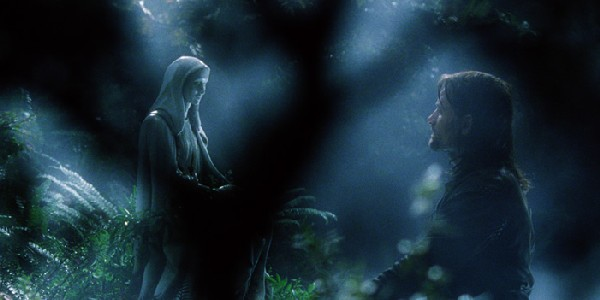The hero or heroine orphaned by their mother is probably as old a plot device as the story-telling itself. However, it may actually be used to achieve many effects – not just to create a tragic setting or to evoke compassion in the audience. For example: Have you ever wondered what on (Middle-)Earth happened to all the mothers in Tolkien’s stories? A dangerous matricidal virus? Or was that political? I, for one, gave it a lot of thought lately and here are my conclusions. Don’t laugh.
Difficult Relationships

In the case of Boromir and Faramir their mother’s death has shaped the relationships in the family. Denethor never seemed to like his younger son, but when Finduilas died, Faramir had only Boromir to turn to. The brothers became close although were still treated unfairly by their, now only, parent – Boromir favoured, Faramir despised and mocked.
The reason of the mother’s death is also worth noting: Finduilas fell weak and ill after Faramir’s birth, her vitality cut down by longing after the sea and the fear of Mordor. Denethor himself reportedly became quite unbearable and this state of affairs kept worsening only to be complete with madness and suicide.
The Special Child

Some of the heroes seem to be orphaned by their mother on account of… their uniqueness. Think about it: the mother dies either in childbirth or soon after not having any more offspring. This is a perfect way to stress the hero being one of a kind, both literally and metaphorically. The only way to make sure there’ll be no more children. And so all the gifts, talents and legacy is embodied in one son or daughter, not two, three or seven.
It’s hard to find a more distinct example of this trope than the story of Fëanor. It has costed his mother, Miriel, all her vital power to bring him into the world, so great he was. And because of that she not only refused to have any more children, but to go on living at all and chose to depart to the Halls of Mandos. She was spent. Among many wonderful works of art she created, Fëanor was her life’s work and there could be nothing else after him.
Stranger Among His Own Kin

Sometimes mother’s death leaves the hero estranged to his/her own people (or um… foster people?). That was the case with Aragorn. Gilraen took refuge in Rivendell acquiring a foster home for her son, but her death left him orphaned in a very special way. They shared the heritage of the Dúnedain culture, to which the House of Elrond did not belong. And so, although surrounded by kindness and friendship, with mother Aragorn lost home. It was not for the long years that he found – or maybe founded – another one.
It was similar with Eomer and Eowyn. When first their father and then their mother died, they were left to be brought up by Theoden. Theoretically a family, but in fact extras to the king’s close family. And while Eomer was out and about enjoying the company and esteem of his men, Eowyn was left to care for her uncle. Don’t get me wrong, caring for your uncle is a noble thing but she was quite lonely. And probably no amount of the people’s love could change that.
Traumatised Mum

The mother who went through a difficult experience could be too traumatised to stay with her children and leave. Like Arwen, Elladan and Elrohir’s mother, Celebrian. After being attacked, captured and tortured by Orcs, she couldn’t bear dwelling in the Middle-Earth anymore. She made a self-care decision and left for Aman. I wonder what Elrond told his children? “Mama has to take care of herself now and so she’s going to stay with uncle Manwë for a while.” Could be, could be…
Formative Role of Motherlessness
Whatever the case, lack of mother often seems to bear a formative significance in Tolkien’s writings. It’s almost as if the hero needed to be cut off from his mother to become an independent individual, putting his own mark upon the world’s history. A fully grown man – or woman – realising that to a degree everyone is alone.
Father symbolises belonging to the history and tradition of the hero’s people, the unbreakable bonds and the cause to fight for. He also represents continuity of the dynasty, heritage of power. Usually if the hero is a son of the ruling house he has good chances to become a king, or at least a prince and carry forth the mythical raison d’être of the nation and keep up its spirit in the hard times. In case of the heroine, her character and strength of spirit would be a visible heirloom of noble blood, like Eowyn’s: Slender and tall she was in her white robe girt with silver; but strong she seemed and stern as steel, a daughter of kings. (The Two Towers).
Mother, however, is an “inner person”, fortress protecting from the chaos of the outer world. She’s the principle of life, giving her child culture, name and belonging. In fact, it is this belonging precisely, that needs to be lost with her death (or departure) and then found again by the hero – this time to keep. If the hero, however, was not to find it, he would be doomed to fall into darkness and chaos to his ultimate demise (e. g. Anakin Skywalker). I was just testing if you’re paying attention^^
And so the loss of a mother becomes a symbol of coming of age and making one’s own irrevocable decisions that will shape the reality. “The hand that rocks the cradle rules the world”.
Featured image: Feanor with his mother Miriel in gardens of Lorien by steamey
